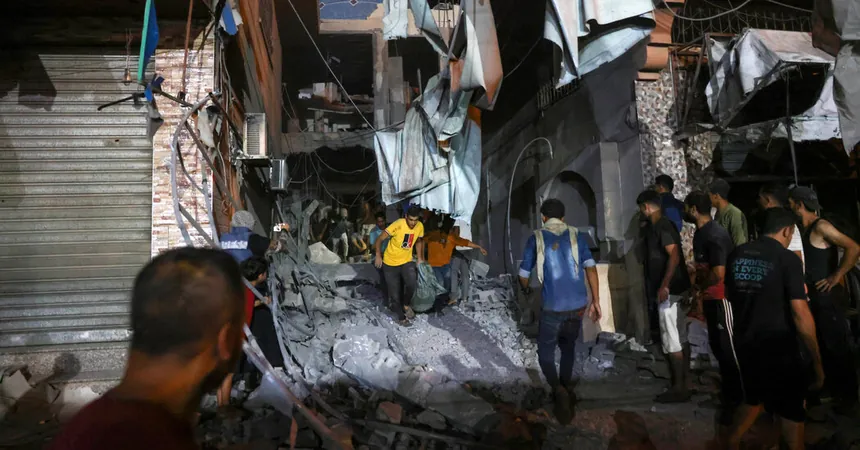
Escalation in Middle East: Israel Intensifies Offensive Against Hezbollah and Hamas
2024-10-06
Author: Ying
Escalation in Middle East: Israel Intensifies Offensive Against Hezbollah and Hamas
In a dramatic move early Sunday, the Israeli military ordered evacuations for most residents of northern Gaza, signaling the onset of what it describes as “a new phase” in its ongoing conflict with Hamas. This announcement followed a wave of airstrikes over Jabaliya, targeting areas known to harbor Hamas fighters and disrupt their efforts to restore operational capabilities.
The Israeli military claimed responsibility for airstrikes on various civilian structures, including a mosque and a school converted into a shelter in Deir al Balah, which it identified as Hamas's “command and control centers.” The Palestinian health ministry reported that these strikes resulted in the deaths of at least 26 Palestinians, with many others suffering injuries.
The conflict has recently escalated beyond Gaza, with Israel increasing attacks on Hezbollah in Lebanon as well, following a barrage of missiles launched at Israel from Iran in retaliation for Israeli actions, including targeted assassinations. Israeli airstrikes reportedly hit just outside Beirut, resulting in massive fireballs and thick plumes of smoke, coinciding with new evacuation warnings for areas dominated by Hezbollah.
These actions have led to calls for an immediate ceasefire. French President Emmanuel Macron, urging for a halt to “all arms shipments” to Israel, asserted that Lebanon "cannot become another Gaza," highlighting the concerns of regional instability and civilian casualties.
As tensions soar, the ghosts of past conflicts loom large. Nearly two decades after the conflict in 2006, Israel's renewed offensive against Hezbollah reflects lessons learned from its prior military engagements. Security analysts emphasize the necessity of a political solution to bring about stability in the troubled region.
The Iranian military's operations have also raised eyebrows. Speculations surrounding Brig. Gen. Esmail Ghaani, the commander of Iran's elite Quds Force, arose following recent Israeli strikes that reportedly targeted Hezbollah leaders. Iranian officials have yet to confirm Ghaani's status officially, fueling concerns within Tehran about the readiness of its military structure.
Israel has intensified its military campaign, focusing on an aggressive airstrike plan that aims to incapacitate Hezbollah’s intricate network and weaponry, which includes an estimated arsenal of over 100,000 missiles. Despite enduring heavy losses due to Israeli bombardment, Hezbollah remains a formidable adversary, having trained thousands of fighters during the Syrian civil war.
The operational risks for Israeli ground forces in Lebanon are significant, especially with the potential for a drawn-out conflict. Military experts warn that without a well-defined exit strategy, Israel may become ensnared in a war of attrition, threatening its gains and exhausting military resources.
Moreover, the Israeli government faces increasing pressure from international allies to minimize civilian harm, as reports of significant casualties continue to emerge. An estimated hundreds of thousands of individuals have been displaced due to the ongoing violence, raising humanitarian concerns.
Amid escalating tensions, U.S. officials, along with those from France and other nations, are attempting to mediate a ceasefire, although progress has been hindered by a lack of agreement between the involved parties.
As military actions unfold, the region remains on edge, awaiting a resolution to prevent further loss of life and destabilization. The urgent call for peace comes at a time when the geopolitical landscape of the Middle East is fraught with uncertainty, requiring swift and substantial diplomatic efforts.




 Brasil (PT)
Brasil (PT)
 Canada (EN)
Canada (EN)
 Chile (ES)
Chile (ES)
 España (ES)
España (ES)
 France (FR)
France (FR)
 Hong Kong (EN)
Hong Kong (EN)
 Italia (IT)
Italia (IT)
 日本 (JA)
日本 (JA)
 Magyarország (HU)
Magyarország (HU)
 Norge (NO)
Norge (NO)
 Polska (PL)
Polska (PL)
 Schweiz (DE)
Schweiz (DE)
 Singapore (EN)
Singapore (EN)
 Sverige (SV)
Sverige (SV)
 Suomi (FI)
Suomi (FI)
 Türkiye (TR)
Türkiye (TR)